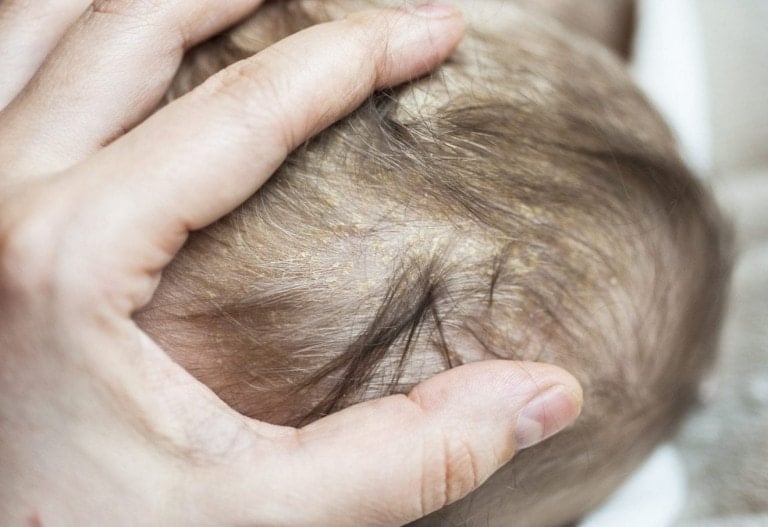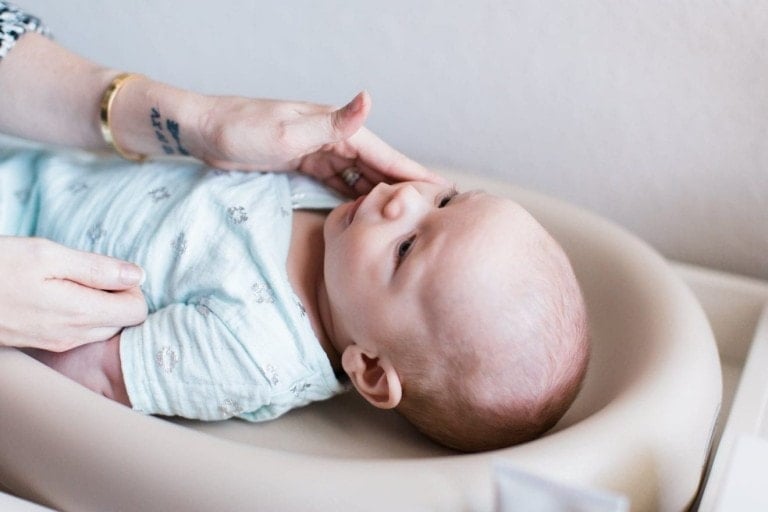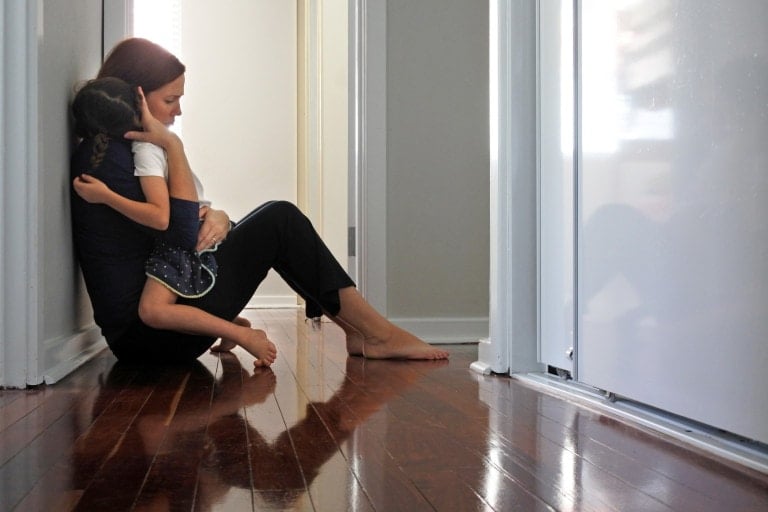Though it may look off-putting, the waxy, white substance (vernix) covering your newborn’s body after birth acts as a super-protector or body butter.1,6 The protocol to wash it off babies immediately has developed out of our germophobic culture, not from an accurate understanding of how it functions. Many moms now choose not to give their newborn a bath immediately after birth to let the vernix remain on the skin for as long as possible. Read on to learn why.
What Is Delayed Newborn Bathing?
Delayed newborn bathing has massive health benefits for your child, including protecting them from infection and regulating their body temperature.1,2 Some hospitals still try to wash off a baby right after birth. However, many now make it standard protocol to wait eight to 24 hours to give a baby their first bath and up to 48 hours if the baby was delivered by cesarean section. There’s no set time to bathe a newborn, so you can leave (and rub in) the vernix coating on the baby’s skin for as long as you want.5 Some mamas even wait until five or six days after birth before giving babies their first bath to let the Vernix absorb longer.
Be sure to speak up and ask for delayed bathing or no bath if that’s what you desire. You should also include it in your birth plan. Delayed newborn bathing is consistent with World Health Organization recommendations and reduces the risk of infections.2
What Is Vernix and Why Is It Helpful?
Vernix is the white substance covering a newborn baby and functions like an anti-germ barrier. It also helps regulate your baby’s body temperature and blood sugar levels.1,2 Vernix protects your baby from the amniotic fluid inside the womb.1 If you wash your baby, the vernix comes off.
This substance has a waxy, almost cheese-like texture.6 It comprises shed or flaked skin cells and sebaceous glands covering the fetus.7 Vernix contains helpful proteins that prevent bacterial infections.1 During delivery, bacteria such as Group B strep (Learn your options if you’re GBS positive during pregnancy) and E. coli can be transmitted to newborns. This can cause blood infections, pneumonia, and meningitis — all of which can be fatal to a newborn.3 Vernix is nature’s protection against these infections.8 It should stay on your baby for at least 24 hours after birth.5,6
Vernix is like a natural lotion that acts as a skin protectant and moisturizer.1,2,7,8 Midwives and naturopaths recommend rubbing it in and leaving it on for as long as possible. You don’t want the baby to lose these natural good bacteria and germ-fighting aspects in the vernix, only to be replaced by artificial lotions absorbed through your baby’s skin into their bloodstream.8
Other Benefits of Delayed Newborn Bathing
Besides the benefits of leaving the vernix on, here are other benefits of waiting to bathe your newborn baby:
- Stable blood sugar: An immediate bath can cause an infant stress. Stress hormones make your newborn’s blood sugar drop. This may make the baby too sleepy to wake up and breastfeed, causing blood sugar levels to drop even more.5,8
- Temperature control: In the first few hours after birth, your baby has to work hard to stay warm as they adjust to room-temperature conditions. After all, they’ve been in your 98.6-degree womb for nine months! A too-soon bath can cause hypothermia.1,2,5,6,8
- Maternal-infant bonding: Taking a baby away from their mom right after childbirth to bathe them interrupts the mother-infant bonding. This time is vital for many healthy processes, including blood sugar and temperature regulation and emotional connection.5,6,8
- Improved breastfeeding: Studies show that mothers and babies have more success with breastfeeding when given “skin-to-skin” time without interruption or baths.9,10 Babies who breastfeed in the first hour of life and practice latching right away have higher rates of success breastfeeding throughout their infancy.11 A bath should not interfere with this time.
Exceptions to Delayed Newborn Bathing
Babies born with chorioamnionitis or meconium staining typically get a bath immediately.3,4 Their risk of infection is much higher. Babies born to moms who are HIV positive or have hepatitis will also get a bath right away. This limits the chances of disease transmission.5 However, you may want to consult your healthcare professional about these circumstances in advance. You will want to establish a plan, which may or may not involve delayed bathing.
Vernix Is Good for Mom, Too
Vernix is a natural lubricant that helps a baby move out of the birth canal more smoothly during delivery. This protects the mom from additional tearing.6 Also, because of its antibacterial and antimicrobial nature, it helps prevent infection in the vaginal canal.1,7
Ask in advance if delayed bathing is a protocol at your delivery location. Vernix is undoubtedly nature’s way of providing baby and mother with a super germ-protecting and healing substance. You’ll want to keep it on your baby for as long as possible. Make it a bullet point on your birth plan. Ensure you establish with your healthcare provider and/or your partner that you want a delayed bath for your infant.































